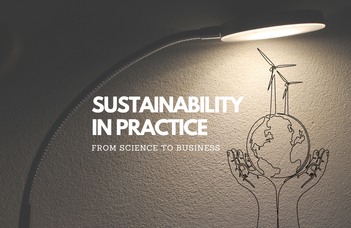Sustainability in Practice: from science to business


The course fee for 1-week on-site courses - that includes tuition fee, meals (coffee break and lunch), local transport and the cost of the leisure time programs - is 490 EUR. All applicants are required to pay 90 EUR (out of this 490) as registration fee at registration. The registration fee is non-refundable.
Credits: 4 EC
Our course offers ECTS points, which may be accepted for credit transfer by the participants' home universities. Those who wish to obtain these credits should inquire about the possible transfer at their home institution prior to their enrolment. The International Strategy Office will send a transcript to those who have fulfilled all the necessary course requirements and request one.
Venue: ELTE Faculty of Science, 1117 Budapest, Pázmány Péter sétány 1/C, Building South, Room: 2.502 (2nd floor)
APPLICATION:
Please pay the registration fee and fill out this form: https://www.elte.hu/en/sustainability-bsu2024
COURSE DESCRIPTION
Apply for our one-week course to explore the fundamentals of climate change, understand the economic and social consequences of our dependence on fossil fuels, and examine the promising yet uncertain routes to a more sustainable future. This course reveals the essential role of sustainable development in ensuring a resilient future, connecting the dots between the need for environmental conservation and economic growth. Dive into the complexities and prospects of transitioning to renewable energy, drawing insights from how global companies are navigating their way towards environmental sustainability. Through engaging workshops, lively discussions, and hands-on experience, participants will delve into the essentials of carbon accounting (GHG Protocol), different methodologies for the assessment of our environmental impact (LCA etc.) and the critical norms and emerging trends that are reshaping the business landscape towards sustainability (CDP, SBTi, SDGs etc.) This course is designed for all those who want to help protect the environment, whether you're a student, a working professional, or an activist. It gives you the knowledge and tools you need to make a difference. Ready to help create a better, more sustainable future? Join us for a week filled with learning, discovery, and actions that lead to a greener tomorrow.
Course schedule
July 15, Monday
Introduction, ice-breaking activities, discussion on the evolution of sustainability, its pillars (economic, environmental, social), and its application in various sectors.
Climate Fresk Workshop: interactive group project to understand the causes and consequences of climate change.
July 16, Tuesday
The Science of Climate Change - An overview of the latest scientific findings on climate change, greenhouse gases, and their impacts on the planet.
Social Effects of Fossil Fuels and Challenges of Energy Transition - Exploring the economic, environmental, and social challenges associated with the dependency on fossil fuels. Discussion on the social conflicts and opportunities in transitioning to renewable energy sources
Field trip: Sustainability themed sightseeing tour
July 17, Wednesday
Introduction to Carbon Accounting - Understanding the basics of measuring greenhouse gas emissions and the importance of emission reporting. Overview of CDP and other international initiatives, exploring global efforts in sustainability reporting and climate action (e.g., CDP, Paris Agreement, Science Based Targets).
Introduction to Lifecycle Assessment (LCA) and its role in identifying environmental impacts associated with all the stages of a product's life. Green Business Models: Exploring sustainable business practices, including circular economy, green supply chain management, and corporate sustainability strategies.
July 18, Thursday
Field visit – Schneider Electric Sustainability Business (exact agenda will be shared later), Nordic Light offices (first LEED platinum rated building in Hungary)
How the theoretical are implemented in practice? Group project: briefing and forming groups for the project that applies course concepts to practical scenarios. The project will focus on developing a sustainability strategy for a hypothetical or real-life business case.
July 19, Friday
Finalizing the group project, presentation, feedback from peers and instructor. Open discussion on the projects presented, focusing on the challenges faced, the feasibility of proposed solutions, and potential impacts. Closing remarks, summarizing key takeaways: what does sustainability mean on a personal, political, corporate level.
